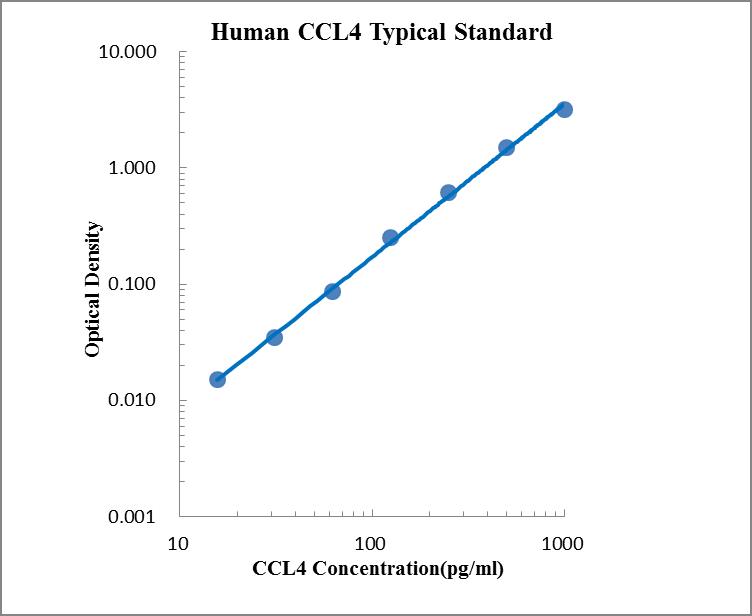Specifications
SHIPPING NOTES
Storing antibodies at various temperatures (up to 40°C) for one week does not affect their activity. As a precautionary measure, we ship all products in insulated packaging with cold packs to provide extra temperature stability in transit. The cold packs may be thawed when you receive the shipment, please be assured that this is normal and your product(s) are safe to use. Once you have received your product(s), please follow the storage instructions on the datasheet(s).
COUNTRY OF ORIGIN
United States of America
APPLICATION
Sandwich ELISA
*USAGE / SAFETY STATEMENT
This product is for research use only. It is not intended for diagnostic or therapeutic use.
CROSS REACTIVITY
This assay has shown no significant cross-reactivity.
DETECTION METHOD
Colorimetric
SPECIFICITY
This kit can assay both natural and recombinant human CCL4.
PRODUCT RANGE
15.63 - 1000 pg/ml
BACKGROUND
Macrophage Inflammatory Proteins (MIP) belong to the family of chemotactic cytokines known as chemokines. In humans, there are two major forms, MIP-1α and MIP-1β that are now officially named CCL3 and CCL4, respectively. CCL4, also known as Macrophage inflammatory protein-1β (MIP-1β) is a CC chemokine with specificity for CCR5 receptors. It is a chemoattractant for natural killer cells, monocytes and a variety of other immune cells. CCL4 is a major HIV-suppressive factor produced by CD8+ T cells.Perforin-low memory CD8+ T cells that normally synthesize CCL4. The cDNAs for human CCL4 encode precursor proteins with a 23 amino acid residue signal peptide that is cleaved to generate the 69 amino acid residue, non-glycosylated mature protein. CCL4 was reported to be twenty-fold less active than CCL3 on the same cell populations. Chemokine activities are mediated by G-protein-coupled seven transmembrane domain receptors. The β chemokine receptor designated CC chemokine receptor-1 (CC CKR-1), alternately named CCL3/RANTES receptor, has been shown to bind CCL3, RANTES, CCL4 and MCP-1 with varying affinities.
SAMPLE TYPE
Cell culture supernatant, serum and plasma.
PRINCIPLE ASSAY
Human CCL4 ELISA Kit is based on the quantitative sandwich enzyme-linked immunosorbent assay technique to measure concentration of human CCL4 in the samples. A monoclonal antibody specific for human CCL4 has been immobilized onto microwells. Standard
or samples are pipetted into the wells, followed by the addition of biotin-linked monoclonal antibody specific for CCL4, and CCL4 present is bound by the immobilized antibody and detect antibody following the first incubation. After removal of any unbound substances, streptavidin-HRP is added for a second incubation. After washing, substrate solution reacts with HRP and color develops in proportion to the amount of CCL4 bound by the immobilized antibody. The color development is stopped by addition of acid and the optical density value is measured by microplate reader.
ASSAY TYPE
Sandwich (quantitative)
RECOVERY
99% (Average Recovery from Serum Samples).


